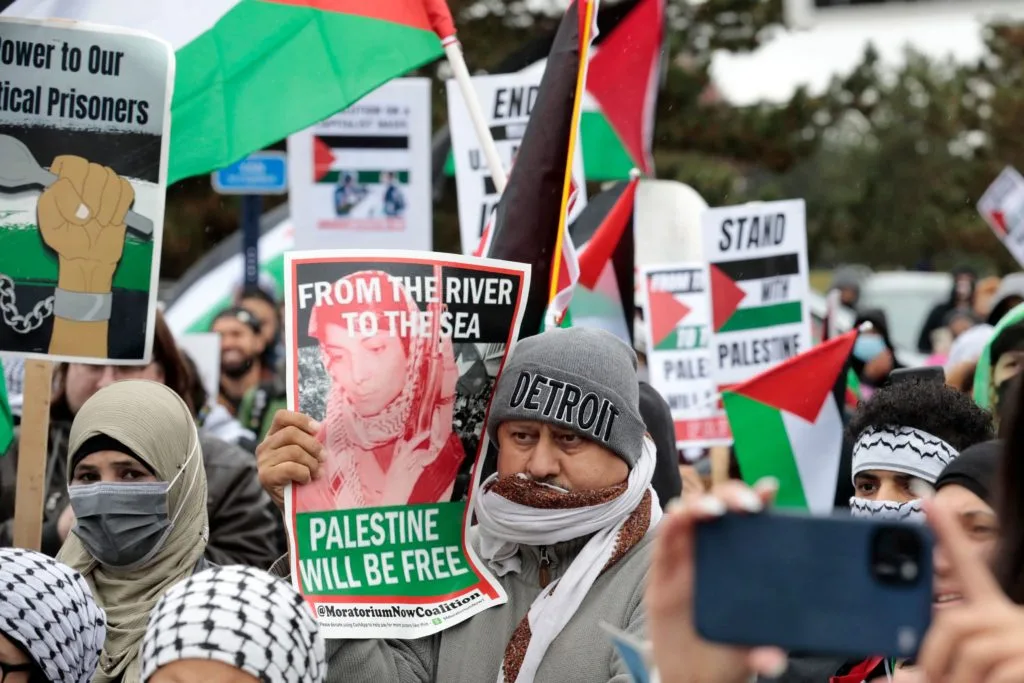DEARBORN, Mich. — For more than 30 years, Suehaila Amen has been an advocate and ambassador for Arab Americans and Muslims in the Detroit area.
In her line of work, she travels and speaks frequently. She wears a hijab – the traditional headscarf some Muslim women wear – and was once a national face of Dearborn, appearing with her family in the 2012 TLC reality series “All-American Muslim.” She has consulted with local and federal agencies on better protections for Arab Americans and Muslims, through recurring waves of Islamophobia.
Hamas’ attack on Israel and the retaliatory siege on Gaza has had reverberations across southeast Michigan, including in Dearborn, where Amen was born and raised, and Dearborn Heights, where she now lives with her family. They are just two of many Detroit suburbs that have been reshaped by the ever-growing Arab American diaspora.
Amen and other residents here are concerned not only about a return to the heights of Islamophobia seen in the aftermath of 9/11, but also how responses from elected officials on the local and national level could shake decades of work that nurtured connections between the Detroit area’s Arab Americans, Muslim and Jewish communities.
“For a woman like myself who’s visibly Muslim and has feared for my safety in a post-9/11 society, at one point I thought I had gotten past all of the negative rhetoric,” Amen said. “It’s difficult being put in a position where you’re constantly looking over your shoulder.”
While President Joe Biden announced his administration will provide $100 million in humanitarian aid to Palestinians in the West Bank and Gaza, his visit to Tel Aviv and the subsequent request for a $105 billion defense package – a funding request that includes more than $14 billion in aid for Israel – drew swift condemnation from Arab Americans across Metro Detroit. Coupled with consistent messaging and backing for the state of Israel during this war, some Arab American community members said they felt betrayed and sidelined, especially after the president promised “a seat at the table” for the community while campaigning for office. Even more concerning, some residents say, is silence or apathy from local leaders.
READ MORE: ‘You are not alone’ Biden tells Israel during visit in aftermath of Oct. 7 Hamas attack
“So many in our Dearborn community carry the scars of war in our memories and our bodies,” Abdullah Hammoud, the first Arab American mayor of Dearborn, said in a statement following Biden’s announcement. “Still, nothing could have prepared us for the complete erasure of our voices and radio silence from those whom we elected to protect and represent us.”
Migration from urban centers, suburban development and general demographic shifts in recent years have made Detroit’s suburbs more diverse than ever.
Dearborn, often seen as a barometer for Arab American sentiment in the U.S., has the largest concentration of Arab Americans in the country, with more than half of the 109,976 residents identifying as Middle Eastern North African Americans in the 2020 census. Arab Americans can also be found in significant numbers in Detroit and other suburbs, including Hamtramck, which elected the country’s first Muslim-majority city council, as well as Warren and Sterling Heights – Michigan’s third- and fourth-largest cities, respectively.
The metropolitan Detroit area is also home to more than 70,000 Jewish residents, according to a 2018 population study conducted by the Jewish Federation of Metropolitan Detroit, many of them living north of the city in the Oakland County suburbs.
Residents stress there is no “us versus them” mentality here, thanks to the work done through several alliances built over the years. “From a community to community level, there is no animosity,” said Bilal Baydoun, an Arab American and a former communications officer for Hammoud.
But Baydoun, who now works as a public policy and research director, said that regardless of identity, he and other Arab Americans are primarily looking for allies to stand with them — and for accountability from those looking the other way or taking stances that can harm their community.
“A lot of the local and domestic politics influence our community,” Baydoun said. “I do think there is an unprecedented energy [now] that you don’t see unless there’s an election looming. I see an unprecedented energy at all levels of government, particularly here in Michigan, to have a sense of empathy — and to not take us for granted.”

President Joe Biden addressed the nation Oct. 19 from the Oval Office to discuss the U.S. response to Hamas’ terrorist attacks against Israel and Russia’s ongoing war against Ukraine. (Photo by Demetrius Freeman/The Washington Post via Getty Images)
A ‘stab in the back’ from elected officials
Amen can trace her family’s origins to the 1890s, when one of her grandparents was born in Indiana and traveled back and forth to the family’s home country in Lebanon. Another one of Amen’s great-grandparents emigrated from Lebanon to the U.S. in 1901, two years prior to Henry Ford incorporating his namesake car manufacturer in Dearborn.
She grew up in the 1980s and remembers when Dearborn was a “ghost town. Now to see the vibrant economy, new businesses coming in – our community has been the epicenter of growth and advancement,” she said.
Amen credits that to immigrant populations that have changed the landscape of Dearborn and some of Detroit’s other suburbs in the past decades. Like Dearborn, her new city of Dearborn Heights also recently elected its first Arab American mayor. “People were flabbergasted that metro Detroit suburbs were thriving,” she said.
That growth, she said, was only possible with community building, conversations across faith and ethnicity, and understanding of immigrants’ connections between their home countries and the U.S.
“We take for granted that we live in Metro Detroit that is full of diversity. A lot of work has been done on the interfaith level, the intercultural level, the interracial level — we always took pride in the advancements that we made. [But] every time we take three steps forward, we take five back.”
Amen said her hopes would be for the Biden administration to call for a ceasefire on both sides of the war, but she fears the U.S. government’s outspoken support of Israel is already stoking levels of Islamophobia. Attacks like the murder of Wadea Al-Fayoume, a 6-year-old Palestinian American in suburban Chicago, could be just the beginning, she added.
“I find it absolutely appalling to see our president give condolences to a family of a child who was murdered — it clearly being a hate crime — only to extend his support and strong stance along with Israel and all the devastation that they’re doing to Palestinian people and the genocide they’re committing,” Amen said.
Now, Amen said, she is hearing of area residents who no longer want to vote for Biden, or are considering voting third-party in 2024.
“We have been loyal to our parties, worked hand in hand with leadership, and worked tirelessly to ensure Muslims and Arabs would have a voice and have a seat at the table,” Amen said. “[But] these elected officials will come to our community, pander to us, sit and tell us lies, and go around and stab you in the back.”
A poll released Tuesday by the Arab American Institute found that 17 percent of Arab American voters said they would support President Joe Biden if the election were held today. That number was 59 percent in 2020, according to the institute. The survey, conducted Oct. 23 to 27, also found Biden’s approval rating among Arab Americans dropped to 29 percent, from 74 percent in 2020.
The negative drops are directly tied to Arab Americans’ views of Biden’s response to the Oct. 7 outbreak of violence between Hamas and Israel, the Institute says.
Nada Al-Hanooti, who lives in Dearborn, said she’s heard of residents planning to abstain from voting, which could undo the work she and others have done to register thousands of Muslims to vote. Al-Hanooti is executive director of Emgage Michigan, an advocacy group that registers Muslim Americans to vote.
“We did a lot of work to elect Biden in Michigan,” Al-Hanooti said, adding that Emgage tracked 145,000 Muslim voters in Michigan during the 2020 presidential election year. Biden narrowly won Michigan against former President Donald Trump in 2020 by less than 155,000 votes. “That just proves Biden needs the Muslim vote to win.”
“Our community is taking good notes, because when it comes time to cast their ballot, they’ll be looking at who’s been supportive,” Al-Hanooti said.
Al-Hanooti is now having conversations with elected leaders at the local and state levels, as well as Michiganders in Washington, in an effort to emphasize the importance of her community’s vote and support.

Rep. Rashida Tlaib (D-Mich.) takes part in an Oct. 18 demonstration to advocate for a halt in hostilities in Gaza. It was organized with the attendance of multiple Jewish groups outside the Capitol Building in Washington, D.C. Photo by Celal Gunes/Anadolu via Getty Images
Democratic Rep. Rashida Tlaib, who represents parts of Detroit and Dearborn and is the only Palestinian American in Congress, drew ire from some of her colleagues when she released a statement saying that the path to Palestinian liberation is “lifting the blockade, ending the occupation, and dismantling the apartheid system that creates the suffocating, dehumanizing conditions that can lead to resistance.”
Democratic Rep. Shri Thanedar, who also represents parts of Detroit, criticized Tlaib’s statement in an interview with Jewish Insider. Thanedar called out Tlaib for referring to the violence in Israel as “resistance,” and saying that “we don’t need such hate and bigotry and antisemitism in the halls of Congress.”
Meanwhile, Republican Rep. Jack Bergman, who represents Michigan’s Upper Peninsula, introduced a resolution to censure Tlaib, saying in a statement that Tlaib “chose to place the blame solely on Israel and the Jewish people.”
Al-Hanooti said Tlaib not only has a right to express her views under free speech, but that criticism of her freedom to do so can be harmful in the long run.
“Jack Bergman and Shri Thanedar don’t realize how much their actions are putting Rashida’s safety on the line, but also putting Arab Americans and Palestinian Americans’ safety on the line,” she said.
Speaking out, with trepidation
Baydoun read about Biden’s Israel visit, which prompted him to post about Dearborn residents’ “sense of betrayal” on X, formerly known as Twitter. Threats of harm, racist taunts and being called a “terrorist” in his inbox forced Baydoun to temporarily disable his account.
“It’s a very dangerous climate for speaking out,” he said. “A lot of my friends are worried about getting blacklisted. They’re worried about getting fired from their jobs.”
Baydoun, who is Lebanese, pointed to Israeli occupation of south Lebanon as one reason why many Dearborn residents, regardless of ethnicity, overwhelmingly identify with the plight of Palestinians.
“I think for Arab people and Arab Americans, the question of Palestinian liberation is a litmus test of every moral idea America espouses,” he said. “Regardless of where Arab Americans come from, we all understand those principles through the prism of Palestine.”
Baydoun said conversations around the positions of elected officials are important. But in the last few days, those discussions are starting to feel “secondary” to Arab Americans questioning their place in the U.S., he added.
“There’s a lot of anger, a lot of feeling of ‘Do we belong anywhere?’ Where do we belong on the American political spectrum?”
And then there is the t-word — “terrorist” — that keeps resurfacing.
“Rashida has been called a ‘terrorist’ by her colleagues by raising the Palestinian flag, which is the flag of her ancestors,” Baydoun said. “In general in the U.S., we don’t have a framework for talking about racism against Palestinians in general. They also teach the language of Islamophobia, when the reality is that racism directed at Palestinians is because the Palestinian identity is criminalized based on foreign policy in the United States.”
READ MORE: Arab American and Muslim mayors sweep local elections in Detroit suburbs
The shared commonality of criminalized identity is why many Arab Americans in Metro Detroit have been able to build interfaith and intercultural unities with Jewish Americans in the region. Over the last month, many Arabs have repeated what has been said for decades: Condemning Israel’s action does not equate to antisemitism.
“The interfaith solidarity in metro Detroit has been very strong. We have a lot of love for our Jewish Michiganders,” Baydoun said.

People demonstrate in support of Palestinians during an Oct. 14 rally in Dearborn, Michigan. Photo by Jeff Kowlalsky/AFP via Getty Images
A watershed moment
Amen and others cited two reasons why there is greater emotion and mobilization around this turning point in more than 70 years of conflict.
One big reason is technology.
“Now you have first- and second- and third-generation Arabs who are more aware, more educated and enlightened. They have access to information more than other immigrants [before],” she said.
As a child, she added, immigrant families’ views on their homelands were shaped by perspectives in Western media, which she said could often be narrow and biased, and were often the only source of information. Now, she marvels at how younger residents can access news from across the world “from their fingertips.”
“I don’t think I ever heard myself saying, ‘I never thought TikTok would give me the reality of what’s going on in the world,’” she said with a slight laugh.
The second is numbers. There are more Arab Americans living in Metro Detroit now than just those living in Dearborn.
“We’re seeing the outrage from multiple communities in the area who are speaking out. They are more cognizant and aware of policies that impact our communities,” she said. “You get to a point that one [group of] people can have their say and another cannot, yet we’re all under the banner of America and being American citizens.”

